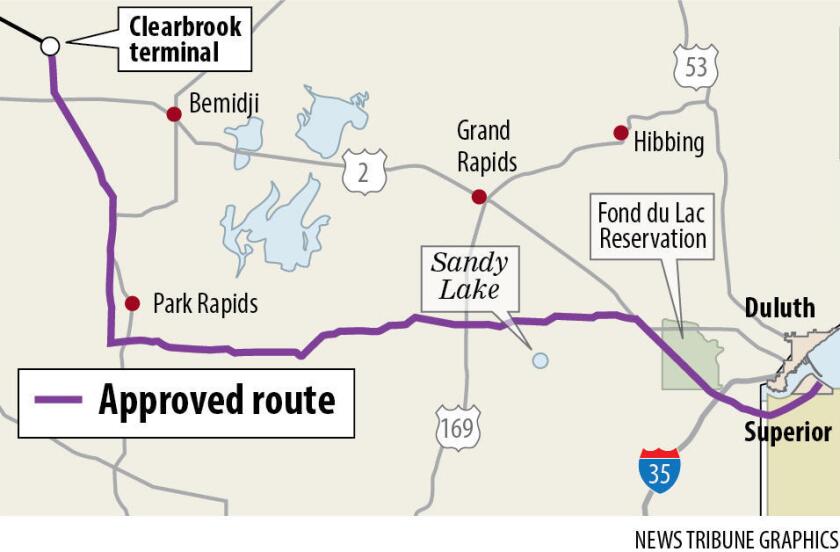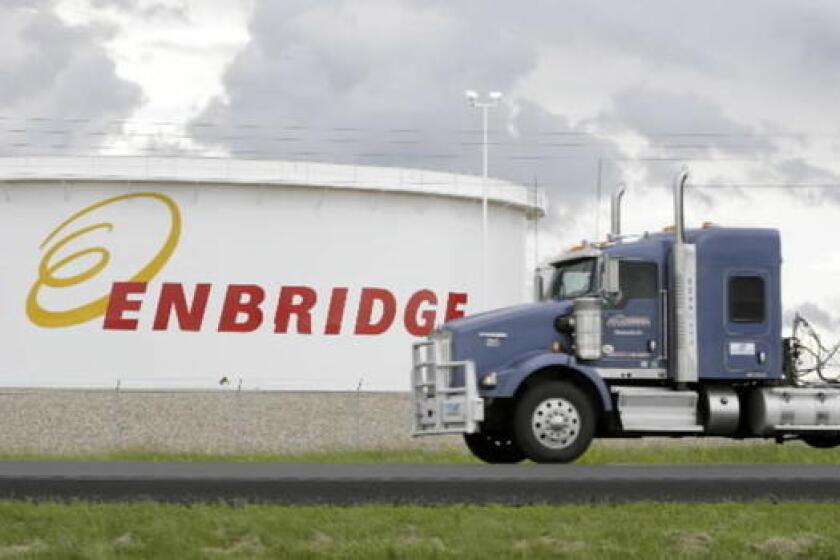DULUTH -- The Minnesota Pollution Control Agency will hold a contested case hearing on a key water permit for Enbridge's proposed Line 3 oil pipeline later this summer. Environmental groups and Minnesota tribes requested a hearing over concerns the pipeline could harm wetlands and streams.
The contested case hearing will put the proposed 340-mile pipeline's 401 certification, a permit awarded by a state's regulators if the project's impact on water falls within the state's standards, in front of an administrative law judge to examine additional evidence and testimony on the project. Federal agencies cannot issue a federal permit or license without a state approving the 401 certification.
In February, the MPCA released a draft of the permit ahead of a public comment period and said it believed the project met the water quality rules. But on Monday, June 1, the agency said the permit's public comment period drew more than 20 requests for a contested case hearing on the permit and the agency "determined that requests related to wetlands and stream protection issues met the threshold to grant a hearing."
“The MPCA is committed to ensuring its 401 water quality certification provides robust and comprehensive protections to Minnesota’s waters and that the agency follows all permitting requirements under the law,” MPCA Commissioner Laura Bishop said in a news release Wednesday, June 3. “The contested case hearing will help ensure the certification is protective of one of Minnesota’s most important resources.”
In a statement, the Sierra Club, one of the environmental groups that asked for a contested case hearing, celebrated the MPCA's decision.
ADVERTISEMENT
“We’re glad to see Laura Bishop and the PCA recognize the critical need for more analysis and public input on the threat Line 3 would pose to Minnesota’s clean water,” Margaret Levin, director of the Sierra Club North Star Chapter, said. “This tar sands pipeline would be a disaster for our waterways and communities, and we are confident that if the MPCA truly listens to public input and follows the science, it will be clear that the only responsible course of action is for the PCA to reject this pipeline permit once and for all.”
Winona LaDuke, co-founder and executive director of Honor the Earth, a native-led environmental group, also applauded the decision in a statement, but said she was "dismayed" the MPCA isn't considering the impacts an oil spill from Line 3 would have on Lake Superior or wild rice.
The group is considering a "judicial appeal of the MPCA’s abdication of its legal duty to protect Minnesota from oil spills," LaDuke said.
To accommodate the hearing, the U.S. Army Corps of Engineers extended its deadline to Nov. 14, the final day the MPCA can make a decision on the permit under the Clean Water Act, which requires the permit to be approved or denied within one year of the application being filed. At that point, it will then be sent to the Army Corps for final approval to ensure it meets Section 404 of the Clean Water Act.
Enbridge is still hoping for the "timely issuance of the remaining permits" so it can start construction on the pipeline by the end of 2020, the company said in a news release Wednesday.
“While the contested case has caused a delay to the permitting process, we believe this additional step will strengthen the MPCA’s decision record,” Vern Yu, Enbridge's president of liquids pipelines, said in the release. “We have planned for various permitting scenarios with the objective of accelerating and completing construction of this important safety and maintenance driven project within six to nine months after we receive final permits.”
Minnesotans for Line 3, Jobs for Minnesotans and Laborers’ International Union of North America, all supporters of the project, expressed disappointment with what the groups called a delay in an already lengthy review process.
"We were hopeful construction of Line 3 would begin in July and provide a lifeline for area workers," Joel Smith, president and business manager of LIUNA Minnesota and North Dakota, said in a news release. "This decision is a setback that wastes more months rehashing the same tired arguments while working families struggle to hang on. The facts are on our side, but time is not."
ADVERTISEMENT
Enbridge's proposed pipeline would carry 760,000 barrels of oil (31.92 million gallons) per day from Alberta, Canada, to the Enbridge terminal in Superior, Wisconsin, and replace the existing, aging Line 3. The new Line 3 would follow a different route through part of the state.

In its release, the MPCA said the contested-case hearing would consider the following questions raised by the Friends of the Headwaters, Sierra Club, Honor the earth, White Earth Band of Ojibwe and the Red Lake band of Chippewa Indians in a joint petition:
- Does Enbridge’s proposed use of trench methods for stream crossings have temporary or permanent impacts on water quality parameters of concern?
- Have Enbridge and the MPCA identified the least degrading crossing method that is prudent and feasible for each stream crossing?
- Have Enbridge and the MPCA undercounted the full acreage of the project’s wetland impacts due to flaws in wetland delineation and survey methodologies related to the seasonality of delineation activities?
- Have Enbridge and the MPCA undercounted the full acreage of wetlands that are physically altered by trenching?
- Have Enbridge and the MPCA incorrectly determined that the impacts to wetlands that are physically altered by trenching are temporary?
The pipeline's other permits, including its certificate of need and route permit approved by the Minnesota Public Unities Commission in a 3-1 vote in February , continue to be challenged by opponents and the Minnesota Department of Commerce that say Enbridge hasn't sufficiency proven the pipeline is needed . Enbridge maintains it has .









